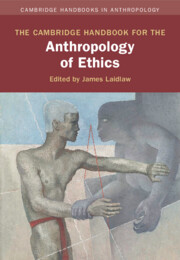Book contents
- The Cambridge Handbook for the Anthropology of Ethics
- Cambridge Handbooks in Anthropology
- The Cambridge Handbook for the Anthropology of Ethics
- Copyright page
- Contents
- Contributors
- 1 Introduction
- Part I Intellectual Sources and Disciplinary Engagements
- 2 Moral and Political Philosophy
- 3 Virtue Ethics
- 4 Agonistic Pluralists
- 5 The Two Faces of Michel Foucault
- 6 Phenomenology
- 7 Cognitive Science
- 8 Theology
- Part II Aspects of Ethical Agency
- Part III Media and Modes of Ethical Practice
- Part IV Intimate and Everyday Life
- Part V Institutional Life
- Index
- References
7 - Cognitive Science
from Part I - Intellectual Sources and Disciplinary Engagements
Published online by Cambridge University Press: 11 May 2023
- The Cambridge Handbook for the Anthropology of Ethics
- Cambridge Handbooks in Anthropology
- The Cambridge Handbook for the Anthropology of Ethics
- Copyright page
- Contents
- Contributors
- 1 Introduction
- Part I Intellectual Sources and Disciplinary Engagements
- 2 Moral and Political Philosophy
- 3 Virtue Ethics
- 4 Agonistic Pluralists
- 5 The Two Faces of Michel Foucault
- 6 Phenomenology
- 7 Cognitive Science
- 8 Theology
- Part II Aspects of Ethical Agency
- Part III Media and Modes of Ethical Practice
- Part IV Intimate and Everyday Life
- Part V Institutional Life
- Index
- References
Summary
Anthropologists and cognitive scientists interested in ethics and morality have much to gain from a two-way dialogue that does not shy away from constructive criticism. This chapter seeks to initiate such a conversation through an overview of three lines of recent research in cognitive science: the evolution of human morality from the standpoint of evolutionary psychology; theories that look to social institutions rather than only evolved psychological dispositions for insight into the variability of human moral dispositions; and studies of how responsibility and intentionality are ascribed in cases of wrongdoing. The final section offers some personal reflections on the methodological challenges of inter-disciplinary engagement, drawing on some of the authors’ recent research on morality and change in western Amazonia. It concludes that anthropologists can use experimental methods creatively, as a way of generating new ethnographic insights; although if genuine conversation on an equal footing is to take place, then ethnography must not only inform experimental design but also be employed to redefine concepts and generate theory.
- Type
- Chapter
- Information
- The Cambridge Handbook for the Anthropology of Ethics , pp. 177 - 204Publisher: Cambridge University PressPrint publication year: 2023

